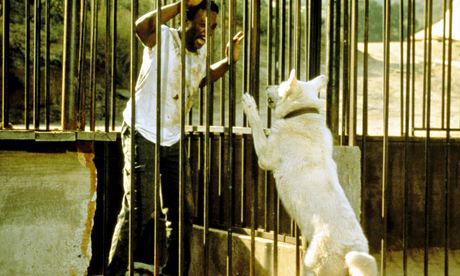
One of American cinema's true mavericks, Samuel Fuller (1912-97), had two major careers – first as a crime reporter for New York tabloids, then as a much-decorated US infantry sergeant in the second world war – before becoming a writer-director. His heyday was the 1950s, making bold thrillers, westerns and war movies, mostly on small budgets. Later he fell on hard times with films aborted, abandoned, butchered and shelved. But he also became a cult figure, revered by European critics and younger filmmakers, the latter giving him cameo roles.
In the early 80s, however, he got to make two highly personal movies, though neither was well handled by their distributors. The Big Red One, his second world war memoir starring Lee Marvin, was well received at Cannes but not widely shown in Fuller's version until after his death. The other, White Dog, is an allegorical melodrama based on an angry fable Romain Gary wrote in the late 1960s about the involvement of his wife, Jean Seberg, with the Black Panthers. It became the subject of absurd controversy and wasn't released in the States for some years.
The screenplay had passed through various hands before Fuller shaped it into a tale, both resonantly mysterious and powerfully direct. A young Hollywood actress, Julie (sensitively played by Kristy McNichol), accidentally hits a German Shepherd dog which, it turns out, has been trained from puppyhood to attack black people. The brave, warm-hearted Julie decides to have this "four-legged time bomb" retrained by movie animal wranglers (Paul Winfield, Burl Ives).
The film pursues a theme that runs through Fuller's work – the stupidity and dangers of prejudice between people of different races, colours, nations and creeds – and it concludes as ambiguously as Fuller's 1957 civil war western Run of the Arrow, which closes with the words: "The end of this film can only be written by you."
The picture has a beguiling, low-key score by Ennio Morricone and is dramatically lit by Bruce Surtees, a cinematographer celebrated for his chiaroscuro effects. Fuller writes passionately about White Dog in A Third Face: My Tale of Writing, Fighting and Film-making, his long, rambling, posthumously published autobiography.

